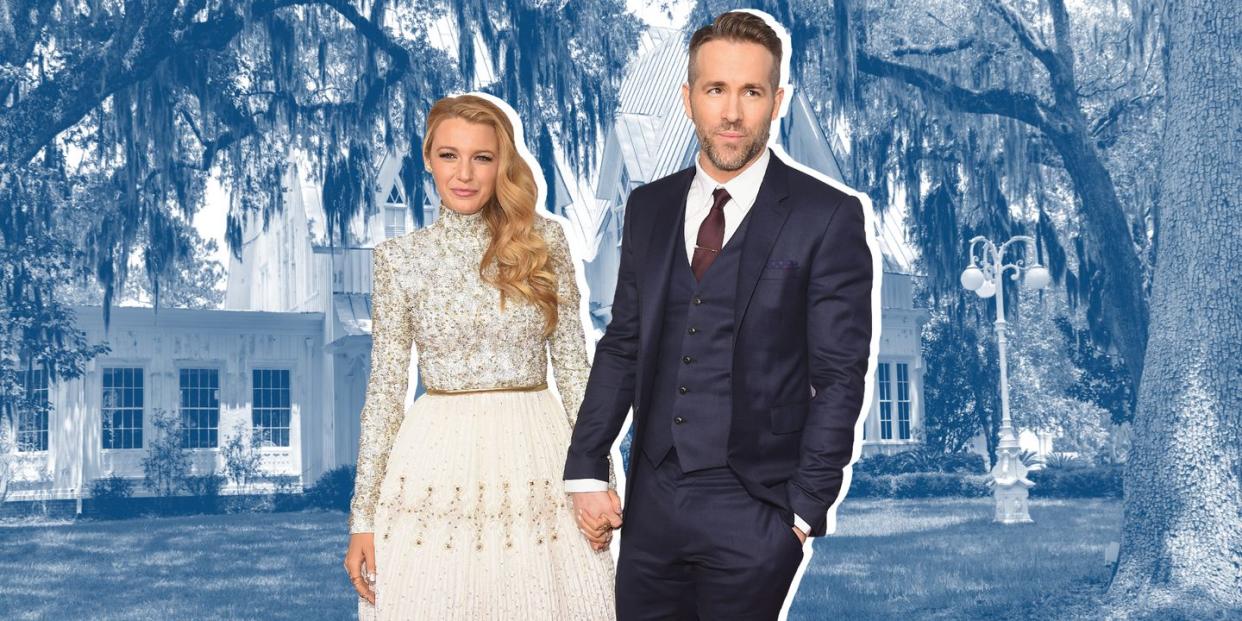Ryan Reynolds and Blake Lively Regret Their Plantation Wedding

When planning their nuptials, some couples dream of having a “classic Southern” wedding at a grand, columned mansion with oak trees covered in Spanish moss and fireflies winking at dusk—a picturesque affair hosted on an antebellum estate that has made its facilities available to rent for parties and events. In other words, a plantation wedding.
But there’s a growing consensus that there’s something deeply wrong with this concept. A beautiful mansion and sprawling estate cannot be separated from a horrifying violent history. These are monuments to American slavery, not a place to hold a celebration or a backdrop for beautiful photos. “If anyone wanted to get married at a plantation, you must ask, ‘What are you doing?’ ‘what exactly are you saying about yourself?’” says Steven Hahn, a historian and the author of A Nation Without Borders: The United States and its World in an Age of Civil Wars.

White Southerners may be the most likely candidates to choose a plantation wedding, as it might be the popular venue in the area, but they are far from alone. Speaking to representatives for plantations like Middleton Place near Charleston, they say that people from all over the world, of all races and genders, opt to have their ceremony and reception there.

There are even celebrity examples. Blake Lively and Ryan Reynolds (who are from California and Vancouver, respectively) married in 2012 at Boone Plantation in South Carolina. Though they received mostly positive coverage at the time, it has sparked criticism on social media since and it is something Reynolds says he and Lively now deeply regret. “It’s something we’ll always be deeply and unreservedly sorry for,” Reynolds recently told Fast Company.
“It’s impossible to reconcile. What we saw at the time was a wedding venue on Pinterest. What we saw after was a place built upon devastating tragedy. Years ago we got married again at home—but shame works in weird ways. A giant fucking mistake like that can either cause you to shut down or it can reframe things and move you into action. It doesn’t mean you won’t fuck up again. But repatterning and challenging lifelong social conditioning is a job that doesn’t end."
Reynolds explained that they want to learn from their mistake, and have donated $200,000 to the NAACP and published an apology on Instagram, vowing to raise their own children to be anti-racist and critical thinkers.
Reynold's apology acknowledges a devastating blind spot that's shared by many: A willful ignorance of what plantations really were. “A plantation is an economic system, a business, in which its profitability is linked to the forced labor of enslaved people,” says Dr. Joy Banner, director of communications at the Whitney Plantation, a museum in Louisiana dedicated to the history of slavery and its legacies. “Plantations are the sites of violence and brutality; an enslaved labor camp with a pretty house on it.
Ignorance of that fact will be much harder to justify in the future. Last year, The Knot, Zola, Martha Stewart Weddings, Pinterest, and others stopped promoting plantations as wedding venues, after Color of Change, an organization that advocates for racial justice, approached the companies with their objections to the practice. Their letter outlined not only the history of these sites as places where humans were enslaved, abused, and separated from their families, but how their use as wedding and event venues continues to affect Black Americans today.
As a petition on their website reads, “Marketing plantations as ‘classic’ or ‘timeless’ places to celebrate a big day communicates a clear message to your Black clients and readers: that their suffering is something to be celebrated, if not completely erased. Plantations are former forced labor camps that brutalized and murdered millions of Black people in this country—they are not party spaces.”
Some wedding vendors have also begun to rethink their participation in weddings held at plantations. Owners of Nashville florist studio FLWR Shop, Alex Vaughan and Quinn Kiesow, were doing a walkthrough with a wedding client several years ago on a plantation, when they came across the slave cabins. “We had never done a plantation wedding before,” Vaughan explains. “I didn’t think about it until I saw the slave cabins and I was like, ‘Of course, horrible, horrible things have happened here.’ So we made it an official policy to never do plantation weddings. We don’t think people who have weddings on plantations are bad people, but we do see it as a failure of our educational system that we don’t make the history real. Rather than confront it, we sweep it under the rug.”
A post shared by Whitney Plantation (@whitneyplantation) on May 22, 2020 at 12:53pm PDT
To be sure, plantations do have value for modern society—just not as wedding venues. There are about 375 plantation museums active in the United States today, and many do not hold weddings. They are powerful places to learn about the history of slavery and for white visitors, places to confront the violence of the past that they may not have truly understood.
“The beliefs and myths people have about plantations are linked to overall how we feel about race and race relations and black labor and service and white supremacy overall,” says the Whitney Plantation’s Dr. Banner. “What is happening now on a large scale with the Black Lives Matter movement is the identification of humanity: how it connects us and how we can confront and recognize racial trauma and suffering. These spaces have a huge opportunity to become places for learning. There is history here. They can be spaces to help each other address the trauma and heal.”
As for weddings? There are plenty of other beautiful places to get married—just not a plantation.
You Might Also Like
